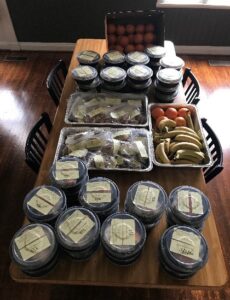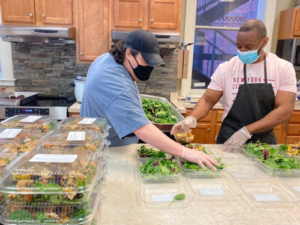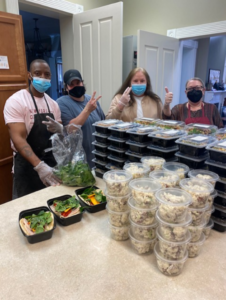by: Trista Genova
 We have all heard that “you are what you eat,” but have you ever really sat back and thought about that? If you take a minute to think about those words and look into the science behind it, you will find that you LITERALLY are what you eat. The food that you put into your body is used to create new cells, repair old cells, and create hormones and enzymes which are then used in all parts of your body. It stands to reason then, that good nutrition is one of the most important things to take a look at for your overall health and well-being. Eating too many processed foods that contain chemicals will eventually alter your body’s chemistry and can lead to debilitating diseases like cancer and diabetes.
We have all heard that “you are what you eat,” but have you ever really sat back and thought about that? If you take a minute to think about those words and look into the science behind it, you will find that you LITERALLY are what you eat. The food that you put into your body is used to create new cells, repair old cells, and create hormones and enzymes which are then used in all parts of your body. It stands to reason then, that good nutrition is one of the most important things to take a look at for your overall health and well-being. Eating too many processed foods that contain chemicals will eventually alter your body’s chemistry and can lead to debilitating diseases like cancer and diabetes.
What people may overlook, however, is how nutrition affects our mental health. The body and the mind are linked together in more ways than one. When you begin to give your body the proper fuel it needs to repair itself and generate new, healthy cells, you begin to feel better not just physically, but also mentally. Proper nutrition supports your body to function in the way that it is designed to. Eating whole foods, fresh produce, seeds, nuts, healthy fats, and lean proteins will not only help you improve your physical health, but it will also help you to feel better emotionally. These foods give you more energy and allow you to heal, both emotionally and physically. Having more energy to face your day helps problems to become more manageable. When you take control of your food choices, you may notice that other things begin to happen. Your body’s immune system improves so you get sick less often, you may notice less pain and inflammation, you may begin to lose weight, your skin may change and have a healthy glow, and you can have less fatigue and more motivation. When these changes start happening, you may begin to feel better about yourself and your mood will follow. Then there is the whole science about how nutrition affects your mental health.
Here is what Psychology Today advises: “Individuals struggling with depressed mood should be encouraged to optimize their diet to ensure adequate consumption of whole foods rich in nutrients that enhance brain function and have antidepressant effects. Recent studies show that foods with the highest antidepressant benefits include oysters and mussels, other seafood, lean organ meats, leafy greens, lettuce, peppers, and cruciferous vegetables such as broccoli, cauliflower, cabbage, kale, and Brussels sprouts. Individuals who prefer not to modify their diets with whole foods should be encouraged to take vitamins, minerals or other supplements are known to have antidepressant effects such as omega-3s, B vitamins, vitamin D, and magnesium.” Making simple lifestyle changes such as eating more whole foods can really make a huge difference in how you feel!
 At MHC’s IC (Independence Center) we strongly believe that food has a direct link to wellness. During the pandemic, we had to switch gears and come up with innovative ways to continue to help those we serve. We all agreed that food is a staple that brings people together and nourishes them in more ways than one. We began a meal delivery program that incorporates fresh fruits and vegetables, whole grains and lean meats into healthy meals that our members can enjoy. Each delivery includes fresh fruit as well. Access to nutritious food can be challenging, especially to those individuals that do not have a car or the money to purchase these items. The deliveries also allowed us to see people each week face to face. They knew that we would be there with a bag of food and a smile. Food often equates with love and a feeling of being cared for and we wanted to show our members that we were still with them, even with a global pandemic going on!
At MHC’s IC (Independence Center) we strongly believe that food has a direct link to wellness. During the pandemic, we had to switch gears and come up with innovative ways to continue to help those we serve. We all agreed that food is a staple that brings people together and nourishes them in more ways than one. We began a meal delivery program that incorporates fresh fruits and vegetables, whole grains and lean meats into healthy meals that our members can enjoy. Each delivery includes fresh fruit as well. Access to nutritious food can be challenging, especially to those individuals that do not have a car or the money to purchase these items. The deliveries also allowed us to see people each week face to face. They knew that we would be there with a bag of food and a smile. Food often equates with love and a feeling of being cared for and we wanted to show our members that we were still with them, even with a global pandemic going on!
With the help of grants from the United Way, the Connecticut Community Foundation, and Creating Healthier Communities, we are proud to say that we have had the privilege to provide these nutritious meals to our members for over one year now. Since the inception of this program we have shopped for, prepared, packaged, and delivered 18,295 meals, 6,875 snacks and almost 1,200 food bank bags!
 Through conversations with our members we have learned that having access to wholesome, nutritious food has really made a difference for them this past year. Our members have told us that they have been able to try new foods. They have shared that this has opened their eyes to what is available and that healthy food can taste delicious. We have heard that individuals have lost weight, better managed their diabetes, felt happier, and have a better sense of overall health and well-being.
Through conversations with our members we have learned that having access to wholesome, nutritious food has really made a difference for them this past year. Our members have told us that they have been able to try new foods. They have shared that this has opened their eyes to what is available and that healthy food can taste delicious. We have heard that individuals have lost weight, better managed their diabetes, felt happier, and have a better sense of overall health and well-being.
What kind of healthy meals do you plan for your well-being? Do you have a favorite recipe? Let us know, we would love to hear about it! Share your favorites on social media and tag us @MentalHealthCT.
Please take a minute to watch the video below to see how healthy food has helped our members in their own words.

